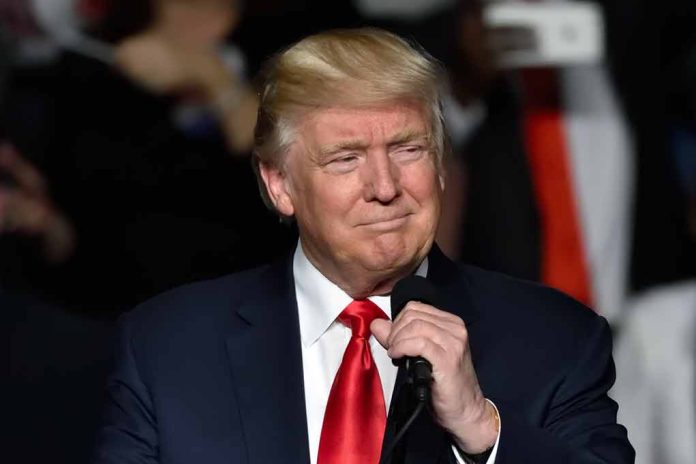
President Trump fires USAID Inspector General Paul Martin after a critical report, raising concerns about foreign aid oversight.
Key Takeaways
- USAID Inspector General Paul Martin was fired following a report critical of the Trump administration’s foreign aid freeze.
- The dismissal is part of a pattern, with Trump having ousted around 20 inspectors general during his presidency.
- A federal judge blocked Trump’s attempt to place 2,200 USAID staff on leave amid legal challenges.
- The administration’s actions have sparked protests and lawsuits, raising concerns about USAID’s future and global humanitarian efforts.
- USAID may be merged with the State Department, potentially leading to significant workforce cuts.
Trump Administration’s Clash with USAID
The United States Agency for International Development (USAID) has found itself at the center of controversy following President Trump’s dismissal of Inspector General Paul Martin. This action came on the heels of a critical report from Martin’s office, which examined the implications of a halt on foreign aid distribution. The report highlighted risks associated with staffing cuts and changes in oversight processes that could negatively impact USAID’s operations.
The Trump administration’s plans for USAID have been met with significant resistance. A federal judge blocked the President’s attempt to place 2,200 USAID staff on leave, amid ongoing legal challenges. This judicial intervention underscores the contentious nature of the administration’s approach to foreign aid and development assistance.
Drastic Cuts and Restructuring
The administration’s vision for USAID involves drastic changes. Plans were unveiled to cut the agency’s staff from 10,000 to about 290, with a narrowed focus on health and humanitarian assistance. This radical downsizing has raised alarms about the future of U.S. foreign aid and its global impact.
“USAID may move, reorganize, and integrate certain missions, bureaus, and offices into the Department of State, and the remainder of the agency may be abolished consistent with applicable law” – Rubio
The potential merger of USAID with the State Department has further fueled concerns about the agency’s autonomy and effectiveness. This restructuring, coupled with significant workforce cuts, could fundamentally alter the landscape of U.S. foreign assistance.
Legal Challenges and Public Outcry
The administration’s actions have not gone unchallenged. A lawsuit has been filed against Trump’s plan to shut down parts of USAID, arguing that it violates the Constitution. This legal action reflects broader concerns about the executive branch’s authority to unilaterally alter congressionally mandated programs and funding.
“One cannot overstate the impact of that unlawful course of conduct: on businesses large and small forced to shut down their programs and let employees go; on hungry children across the globe who will go without; on populations around the world facing deadly disease; and on our constitutional order,” the U.S. businesses and organizations said.”
Public response to these developments has been swift. A protest titled “Rally to Restore Foreign Aid Now” was organized, with lawmakers such as Senators Tim Kaine and Chris Coons scheduled to speak. This grassroots movement underscores the widespread concern about the future of U.S. foreign aid and its role in global humanitarian efforts.
Implications for Foreign Aid and Oversight
The dismissal of Inspector General Paul Martin is particularly troubling given the timing. It occurred just a day after he released a report criticizing the administration’s foreign aid freeze. This action raises serious questions about the independence of oversight mechanisms within government agencies.
To be clear, firing inspectors-general without 30-days notice under the Inspector General Reform Act of 2008 that includes a “substantive rationale” per the Securing Inspector General Independence Act of 2022, is unlawful. https://t.co/SOdwCFcC48 https://t.co/10u8QxStsP
— Janai Nelson (@JNelsonLDF) February 12, 2025
Martin’s office had warned that the Trump administration’s actions severely hindered oversight of $8.2 billion in unspent humanitarian funds. This lack of proper oversight not only jeopardizes the effective use of taxpayer money but also potentially compromises the integrity of U.S. foreign aid programs.
As the situation continues to unfold, the future of USAID and its critical role in global humanitarian efforts remains uncertain. The Trump administration’s actions have sparked a broader debate about the role of foreign aid in U.S. foreign policy and the proper balance between executive authority and congressional mandates.
Sources:
- White House fires USAID inspector general following critical report
- USAID Controversy Live Updates: Inspector General Fired After Critical Report Against Trump Administration
- Trump fires USAID’s inspector general after report critical of funding freeze – POLITICO
- White House fires USAID watchdog amid funding freeze controversy



